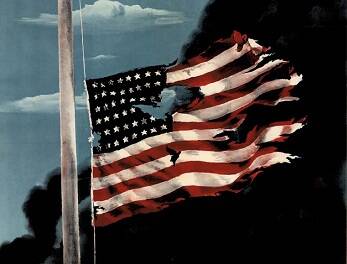The Puritans hadn’t yet disembarked, before they were assigning their America a religious identity and mission. John Winthrop’s 1630 sermon “A Model of Christian Charity” was preached at sea, aboard the Arbella. He told his flock that their new community would be “as a city upon a hill—the eyes of all people are upon us.” A century later, in 1740, the Reverend Jonathan Edwards drew upon that same streak of Protestant millennialism when he prophesized that “the dawning, or at least the prelude, of that glorious work of God…will begin in America.”
Self-identity isn’t self-constructed. It’s typically created by distinguishing one’s self, or one’s group, from others, the ones who aren’t as good, as industrious, who aren’t God’s chosen ones. America has gone through a long list of those others: papists, the North American “savages," Asian hordes, European empires, communists, and now international terrorists. We ratify our God-given identity by repudiating any goodness in others. Donald Trump, for example, calls his political opponents “losers.” (He never promised eloquence.)
Self-identity isn’t self-constructed, and sometimes it implodes under the pressure of events. Pearl Harbor, Mi Lai, Katrina, September 11th, Abu Ghraib: whether the evil was moral or natural, perpetrated by us or upon us, Americans remember the events that have challenged our sense of being “God’s chosen.”
You can hear Americans struggling with our self-identity in this New York Times entry of April 16th, 1865, responding to the death of Abraham Lincoln.
When John Kennedy died, the Times recorded that “A thousand people gathered along Pennsylvania Avenue opposite the White House as dusk settled, drawn irresistibly to stand and wait—for what they did not quite know…In some hospitals, physicians and nurses went on emergency rounds to give sedatives to patients who were agitated by the news.” In New York City, inside Saint Patrick’s, “Women used improvised ways to cover their heads — paper napkins, envelopes and pocketbooks.”
What had happened to our “city on a hill?” Was America truly the “glorious work of God?” After the death of Dr. Martin Luther King, Jr, Dorothy Saunders, of Cherry Hill, New Jersey pleaded, with no little irony, “When statesmen look to give aid to the uncivilized and underdeveloped countries of the world, please let ours be first on their list.” James Thompson, a pastor in West Branch, Iowa, couldn’t help but to wonder, “Why must we always kill our prophets before we will listen to them?”
Self-identity isn’t self-constructed. As Christians we believe that our deepest identities are given to us by God. Before the stars were hung, or the mountains set in stone, God dreamt of us, God knew us, God gave us an identity.
In Christ, in the pattern that he brought into the world, we receive our mission, our identity, our name. But note, carefully, the pattern, which Jesus wove. It isn’t: “strength through walls,” “take care of number one,” or “let someone else do it.”
Nations, and individuals, self-identify as God’s chosen ones. The Puritans weren’t wrong in doing that. Christians have been called into the Christ. The question is the depth of that identification. It is to service, to suffering, even to death.
Lincoln, Kennedy, Dr. King: like so many other fallen Americans, they were conformed unto the Christ. But we are called to a heroism beyond bullets and battlefields. Justice and peace are of God. To receive them, the depths of the human must be laid open. God’s city upon a hill, wherever it rises, is a city that remembers the poor, that welcomes the stranger, that enables all its citizens.
Isaiah 53: 10-11 Hebrews 4: 14-16 Mark 10: 42-45








